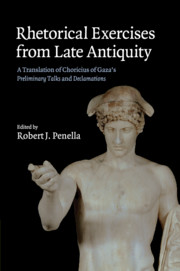 Rhetorical Exercises from Late Antiquity
Rhetorical Exercises from Late Antiquity Book contents
- Frontmatter
- Contents
- List of contributors
- Foreword
- Introduction
- I CHORICIUS, PRELIMINARY TALKS
- II CHORICIUS, DECLAMATIONS
- 2 Declamation 1 [X]:
- 3 Declamation 2 [XII]:
- 4 Declamation 3 [XIV]:
- 5 Declamation 4 [XVII]:
- 6 Declamation 5 [XX]:
- 7 Declamation 6 [XXIII]:
- 8 Declamation 7 [XXVI]:
- 9
- 10 Declamation 9 [XXXV]:
- 11 Declamation 10 [XXXVIII]:
- 12 Declamation 11 [XL]:
- 13 Declamation 12 [XLII]:
- Epilogue: The fortune and reception of Choricius and of his works
- Bibliography
- Index
8 - Declamation 7 [XXVI]: <The Tyrannicide>
from II - CHORICIUS, DECLAMATIONS
Published online by Cambridge University Press: 29 January 2010
- Frontmatter
- Contents
- List of contributors
- Foreword
- Introduction
- I CHORICIUS, PRELIMINARY TALKS
- II CHORICIUS, DECLAMATIONS
- 2 Declamation 1 [X]:
- 3 Declamation 2 [XII]:
- 4 Declamation 3 [XIV]:
- 5 Declamation 4 [XVII]:
- 6 Declamation 5 [XX]:
- 7 Declamation 6 [XXIII]:
- 8 Declamation 7 [XXVI]:
- 9 Declamation 8 [XXIX]:
- 10 Declamation 9 [XXXV]:
- 11 Declamation 10 [XXXVIII]:
- 12 Declamation 11 [XL]:
- 13 Declamation 12 [XLII]:
- Epilogue: The fortune and reception of Choricius and of his works
- Bibliography
- Index
Summary
[THEME]
The law allows anyone who kills a tyrant to claim whatever reward he wishes. Someone went up to the acropolis armed with a dagger to kill the tyrant. Finding him absent, he killed the tyrant's son, his parent's only child. When the father saw what had happened he was overcome by emotion to such an extent that he killed himself. Hence the man who killed the youth claims the reward on the grounds that he was responsible for the tyrant's death. Someone else opposes. Let us take the role of the claimant.
EXPLANATORY COMMENT
[1] Clearly, those who want to indulge a taste for contentiousness are not bereft of occasions for dispute! A man who has freed his whole fatherland from tyranny is prevented from receiving the reward prescribed by the laws. And yet he has two ways to enhance his request's appearance, having destroyed the tyrant in respect of his intention, his offspring in respect of his achievement. [2] This convergence of valor and fortune allows him to persist in holding no ordinary opinion of himself. If Pericles son of Xanthippus, deflecting mere abuse, worked his way through every mode of commendation in his own self-praise, who could criticize this man for using the same means to ward off a challenge that is trying to deprive him of the reward he deserves? In the same way, Demosthenes' victory over the son of Atrometus brought him the proper reward, his crown.
- Type
- Chapter
- Information
- Rhetorical Exercises from Late AntiquityA Translation of Choricius of Gaza's Preliminary Talks and Declamations, pp. 142 - 157Publisher: Cambridge University PressPrint publication year: 2009


